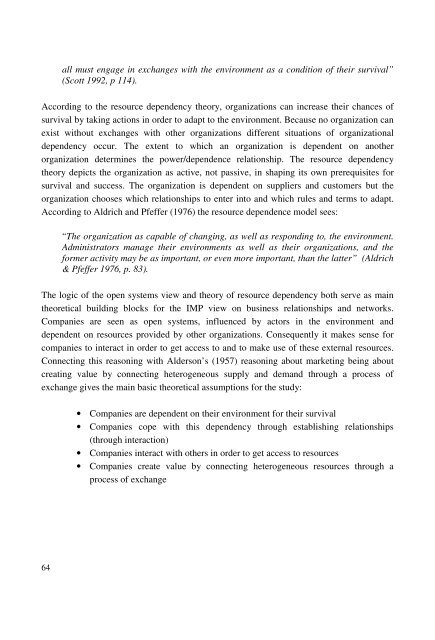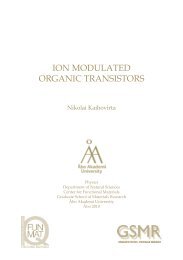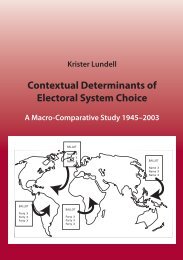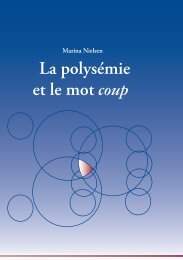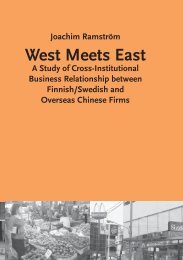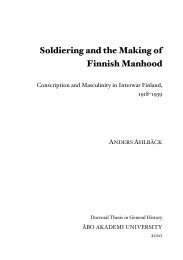Value Co-Creation in Industrial Buyer-Seller Partnerships ... - Doria
Value Co-Creation in Industrial Buyer-Seller Partnerships ... - Doria
Value Co-Creation in Industrial Buyer-Seller Partnerships ... - Doria
- No tags were found...
Create successful ePaper yourself
Turn your PDF publications into a flip-book with our unique Google optimized e-Paper software.
all must engage <strong>in</strong> exchanges with the environment as a condition of their survival”(Scott 1992, p 114).Accord<strong>in</strong>g to the resource dependency theory, organizations can <strong>in</strong>crease their chances ofsurvival by tak<strong>in</strong>g actions <strong>in</strong> order to adapt to the environment. Because no organization canexist without exchanges with other organizations different situations of organizationaldependency occur. The extent to which an organization is dependent on anotherorganization determ<strong>in</strong>es the power/dependence relationship. The resource dependencytheory depicts the organization as active, not passive, <strong>in</strong> shap<strong>in</strong>g its own prerequisites forsurvival and success. The organization is dependent on suppliers and customers but theorganization chooses which relationships to enter <strong>in</strong>to and which rules and terms to adapt.Accord<strong>in</strong>g to Aldrich and Pfeffer (1976) the resource dependence model sees:“ The organization as capable of chang<strong>in</strong>g, as well as respond<strong>in</strong>g to, the environment.Adm<strong>in</strong>istrators manage their environments as well as their organizations, and theformer activity may be as important, or even more important, than the latter” (Aldrich& Pfeffer 1976, p. 83).The logic of the open systems view and theory of resource dependency both serve as ma<strong>in</strong>theoretical build<strong>in</strong>g blocks for the IMP view on bus<strong>in</strong>ess relationships and networks.<strong>Co</strong>mpanies are seen as open systems, <strong>in</strong>fluenced by actors <strong>in</strong> the environment anddependent on resources provided by other organizations. <strong>Co</strong>nsequently it makes sense forcompanies to <strong>in</strong>teract <strong>in</strong> order to get access to and to make use of these external resources.<strong>Co</strong>nnect<strong>in</strong>g this reason<strong>in</strong>g with Alderson’ s (1957) reason<strong>in</strong>g about market<strong>in</strong>g be<strong>in</strong>g aboutcreat<strong>in</strong>g value by connect<strong>in</strong>g heterogeneous supply and demand through a process ofexchange gives the ma<strong>in</strong> basic theoretical assumptions for the study:• <strong>Co</strong>mpanies are dependent on their environment for their survival• <strong>Co</strong>mpanies cope with this dependency through establish<strong>in</strong>g relationships(through <strong>in</strong>teraction)• <strong>Co</strong>mpanies <strong>in</strong>teract with others <strong>in</strong> order to get access to resources• <strong>Co</strong>mpanies create value by connect<strong>in</strong>g heterogeneous resources through aprocess of exchange64


